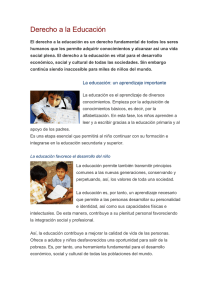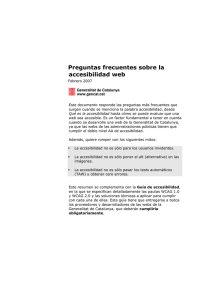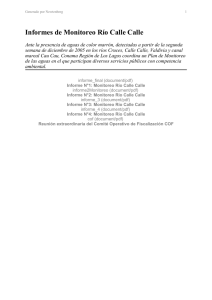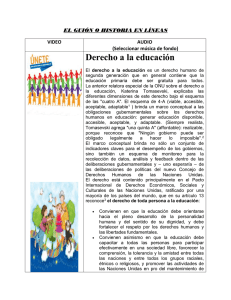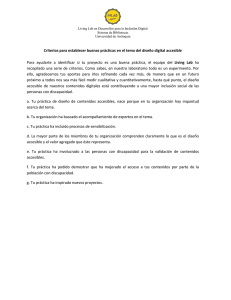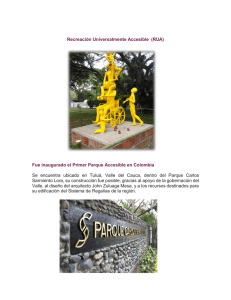en otra ventana
Anuncio
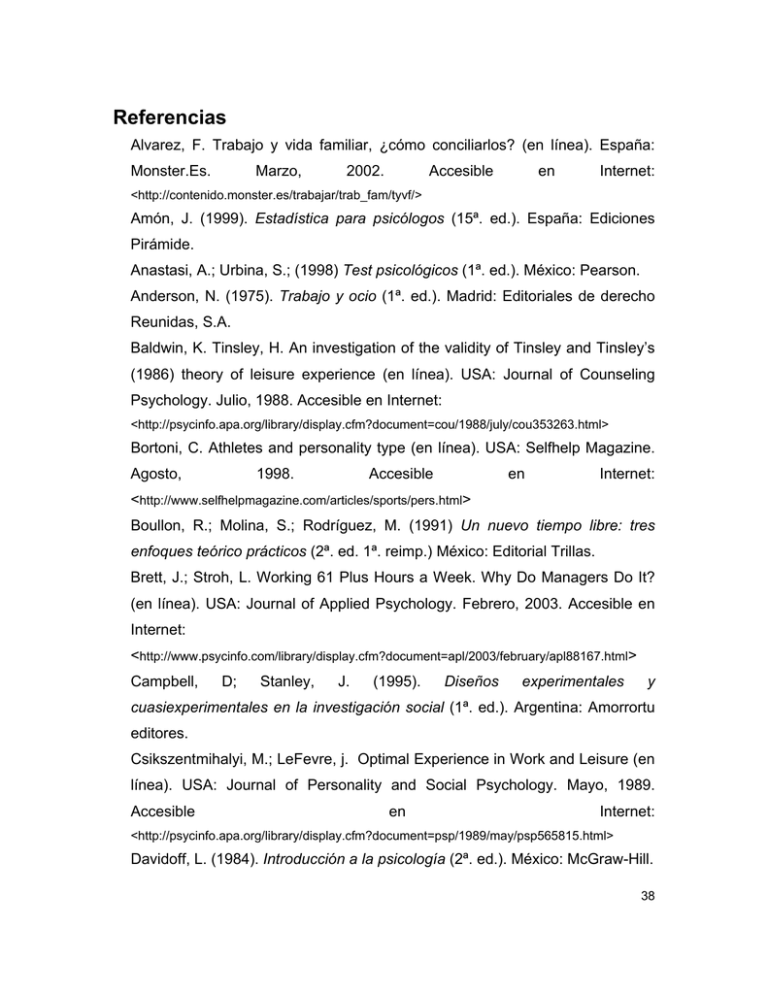
Referencias Alvarez, F. Trabajo y vida familiar, ¿cómo conciliarlos? (en línea). España: Monster.Es. Marzo, 2002. Accesible en Internet: <http://contenido.monster.es/trabajar/trab_fam/tyvf/> Amón, J. (1999). Estadística para psicólogos (15ª. ed.). España: Ediciones Pirámide. Anastasi, A.; Urbina, S.; (1998) Test psicológicos (1ª. ed.). México: Pearson. Anderson, N. (1975). Trabajo y ocio (1ª. ed.). Madrid: Editoriales de derecho Reunidas, S.A. Baldwin, K. Tinsley, H. An investigation of the validity of Tinsley and Tinsley’s (1986) theory of leisure experience (en línea). USA: Journal of Counseling Psychology. Julio, 1988. Accesible en Internet: <http://psycinfo.apa.org/library/display.cfm?document=cou/1988/july/cou353263.html> Bortoni, C. Athletes and personality type (en línea). USA: Selfhelp Magazine. Agosto, 1998. Accesible en Internet: <http://www.selfhelpmagazine.com/articles/sports/pers.html> Boullon, R.; Molina, S.; Rodríguez, M. (1991) Un nuevo tiempo libre: tres enfoques teórico prácticos (2ª. ed. 1ª. reimp.) México: Editorial Trillas. Brett, J.; Stroh, L. Working 61 Plus Hours a Week. Why Do Managers Do It? (en línea). USA: Journal of Applied Psychology. Febrero, 2003. Accesible en Internet: <http://www.psycinfo.com/library/display.cfm?document=apl/2003/february/apl88167.html> Campbell, D; Stanley, J. (1995). Diseños experimentales y cuasiexperimentales en la investigación social (1ª. ed.). Argentina: Amorrortu editores. Csikszentmihalyi, M.; LeFevre, j. Optimal Experience in Work and Leisure (en línea). USA: Journal of Personality and Social Psychology. Mayo, 1989. Accesible en Internet: <http://psycinfo.apa.org/library/display.cfm?document=psp/1989/may/psp565815.html> Davidoff, L. (1984). Introducción a la psicología (2ª. ed.). México: McGraw-Hill. 38 Elias, N.; Dunning, E. (1992) Deporte y ocio en el proceso de civilización (1ª. ed.). México: FCE. ENEP Iztacala. Apuntes de la materia de modelos matemáticos 1. Enero, 2003. Accesible en Internet: <http://biologia.iztacala.unam.mx/directorio/modelos_matematicos1.html http://www.medal.org.ar/stadhelp/Std00013.htm http://www.medal.org.ar/stadhelp/Std00012.htm> Garret, H. (1983). Estadística en psicología y educación (1ª. ed.). España: Paidós. Guízar, R. (1998). Desarrollo organizacional: principios y aplicaciones (1ª. ed.). México: McGraw-Hill. Goleman, D. (1999). La inteligencia emocional en la empresa (2ª. ed.). México: Javier Vergara Editores. Hansen, J. Scullard, M. Psychometric evidence for the leisure interest questionnaire and analyses of the structure of leisure interests (en línea). USA: Journal of Counseling Psychology. Julio, 2002. Accesible en Internet: <http://www.psycinfo.com/library/display.cfm?document=cou/2002/july/cou493331.html> Herrera, A. Jaimez, M. (1983). Técnica de Cleaver en la elaboración de profesiogramas. Tesis inédita de licenciatura en psicología. Universidad de las Américas, A.C. Cholula, Puebla. Hersey, P. Blanchard, K. Johnson, D.; (1998). Administración del comportamiento organizacional (7ª. ed.) . México: Prentice Hall. Hogarth, R; (2002). Educar la intuición: el desarrollo del sexto sentido (1ª. ed.). España: Ediciones Paidós Ibérica S.A. Ibáñez, E; (2001). Inteligencia emocional y satisfacción laboral de Jefes y subordinados: estudio comparativo entre dieciocho organizaciones públicas y privadas pertenecientes al segundo y tercer sector del estado de Puebla. (1a. ed.). México: Universidad de las Américas, Puebla. Jewell, L; Siegall, M. (1990). Contemporary Industrial/Organizational Psychology (2ª. ed.). USA: West Publishing Company. 39 Kelly, J; Freysinger, V. (2000). 21st Century leisure: current issues (1ª. ed.). USA: Allyn and Bacon. Kelly, J; Godbey, G. (1992). The sociology of leisure (1ª. ed.). USA: Venture Publishing, Inc. Kerlinger, F. (1997). Investigación del comportamiento (1ª. ed.). México: Mc Graw - Hill. Kleinbaum, D; Kupper, L; Muller, K; (1988). Applied regression analysis and other multivariable methods. (2ª. ed). USA: PWS-KENT Publishing Company. Larson, R. Verma, S. How children and adolescents spend time across the world work, play and developmental opportunities (en línea). USA: Psychological Bulletin. Noviembre, 1999. Accesible en Internet: < http://www.psycinfo.com/library/display.cfm?document=bul/1999/november/bul1256701.html> Leitner, M.; Leitner, S. (1989). Leisure enhancement (1ª. ed.). USA: Haworth Press. Mankin, D. (1978). Toward a post - industrial psychology : emerging perspectives on technology, work, education, and leisure (1ª. ed.). USA: Wiley. Masters, K. Lacaille, R. Shearer, D. The acute affective response of type A behaviour pattern individuals to competitive and noncompetitive exercise (en línea). Canada: Canadian Journal of Behavioural Science Enero, 2003. Accesible en Internet: <http://www.psycinfo.com/library/display.cfm?document=cbs/2003/january/cbs35125.html > Munné, F. (1988). Psicosociología del tiempo libre : un enfoque critico. (1ª. ed.). Mexico: Ed. Trillas. Pieper, J. (1952). Leisure, the basic of culture (1ª. ed.). Londres: Faber and Faber. Posner, J. Lowe, D. After-School Activities and the Development of LowIncome Urban Children (en línea). USA: Developmental Psychology. Mayo, 1999. Accesible en Internet: <http://psycinfo.apa.org:80/ftdocs/dev/1999/may/dev353868.html> 40 Robbins, S. (1979). Comportamiento Organizacional (8ª. ed.). México: Prentice Hall. Rodríguez, A. (1999). Introducción a la psicología del trabajo y de las organizaciones (1ª. ed.). España: Ediciones Pirámide. San Martín, J. (1997). Psicosociología del ocio y turismo (1ª. ed.). España: Ediciones Aljibe. Schultz, D. (1991). Psicología Industrial (3ª. ed.). México: Mc Graw - Hill. Sonnentag, S. Work, recovery activities, and individual well-being (en línea). USA: Journal of Occupational Healt Psychology. Marzo, 2000. Accesible en Internet: <http://www.psycinfo.com/library/display.cfm?document=ocp/2001/july/ocp63196.html> Sonnentag, S. Recovery, work engagement, and proactive behavior. A new look at the interface between nonwork and work (en línea). USA: Journal of Applied Psychology. Junio, 2003. Accesible en Internet: <http://www.psycinfo.com/library/display.cfm?document=apl/2003/june/apl883518.html> Steinberg, H. Nicholls, B. Sykes, E. LeBoutillier, N. Ramlakhan, N. Moss, T. Dewey, A. Weekly exercise consistently reinstates positive mood (en línea). London: European Psychologist Diciembre, 1998. Accesible en Internet: <http://www.psycinfo.com/library/display.cfm?document=epp/1998/december/epp34271.html> Sue, R. (1992). El ocio (2ª. reimp.). México: Fondo de Cultura Económica Szilagyi, A. (1980). Organizational behavior and performance (2ª. ed.). USA: Goodyear Publishing Company, Inc. Taborga, H. Cómo hacer una tesis (13ª. ed.). México: Grijalbo Tatsuoka, M. (1971). Multivariate analysis: techniques for educational and psychological research (1ª. ed.). USA: John Wiley & Sons. Tinsley, H. Eldredge, B. Psychological benefits of leisure participation; a taxonomy of leisure activities based on their need-gratifying properties (en línea). USA: Journal of counseling psychology. Abril, 1995. Accesible en Internet: <http://www.psycinfo.com/library/display.cfm?document=cou/1995/april/cou422123.html> 41 Toffler, A. (1981). La tercera ola (1ª. ed). México: 1981 Valbuena, B. (2000). Actitud de compromiso en el trabajo: validación de un instrumento de medición. Tesis inédita de licenciatura en psicología. México: Universidad de las Américas, Puebla Veblen, T. (1934) The theory of the leisure class : an economic study of institutions. USA: The modern library 42
